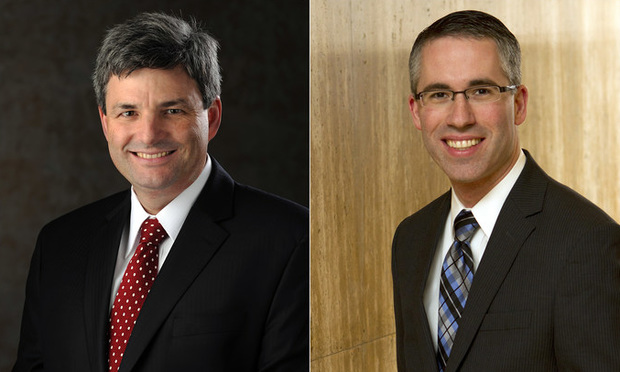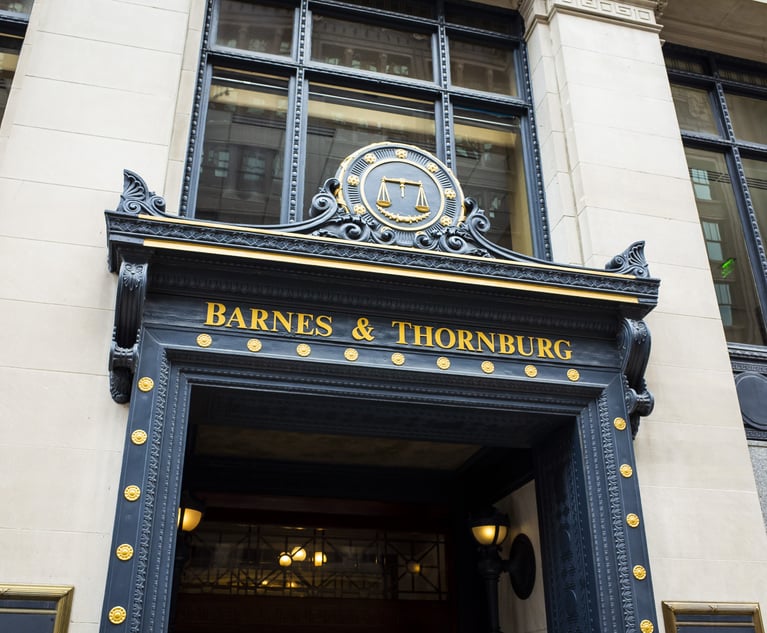Georgia Prosecutors, Public Defenders Keep Their Eyes on Salaries
In Georgia, starting pay for prosecutors and public defenders is $44,828.
July 06, 2018 at 02:19 PM
3 minute read
 Bert Poston (left) and Bryan Tyson
Bert Poston (left) and Bryan Tyson
While Big Law salaries started to increase last month with some New York firms offering rookie lawyers up to $190,000 a year, public sector lawyers in Georgia and around the country are focused on much smaller numbers.
In Georgia, starting pay for prosecutors and public defenders is $44,828. Nationally, the median entry-level salary for a local prosecutor is $56,200 and $58,300 for public defenders, according to the National Association for Law Placement, which released its 2018 Public Service Attorney Salary Survey last month.
Salaries for most Georgia prosecutors and public defenders have matched each other, since a move by the General Assembly two years ago. But, because the compensation systems were not linked until recently, prosecutors have lingering problems that public defenders do not.
Bert Poston, who chairs the state Prosecuting Attorneys' Council, said promotions for prosecutors were frozen in 2008 during the Great Recession. “We've never recovered from that,” said Poston, the district attorney for the Conasauga Circuit. He's referring to veteran prosecutors earning less than they should be paid under a schedule based on years of experience.
Some large counties supplement prosecutors' pay or fund prosecutor positions, but the practice varies widely, said Poston. He added that the General Assembly has funded some raises over the past 10 years, but some veteran prosecutors still endure salary compression, where they earn only a little bit more than less-experienced colleagues. By comparison, he also noted the starting salary for a Georgia state trooper, which requires a high school education and a training period, is $46,422—$1,594 more than rookie prosecutors.
Poston also pointed to a fact of life for many lawyers—law school debt. A 2015 survey showed Georgia prosecutors owe an average of about $100,000, and he said, “You just can't get that paid off at that level.”
“I've lost a couple of good ADAs over the last couple of years because they simply could not afford to raise a family on what I was able to pay them, and I'm sure every other DA in the state could tell you similar stories,” Poston said.
Bryan Tyson, executive director of the Georgia Public Defender Council, said salary parity between most prosecutors and public defenders helped. “We were constantly trading people back and forth” as lawyers sought better pay, he said.
He said that, because public defenders have been paid according to the prosecutors' pay schedule for only a couple of years, lawyers from his side of the courtroom are not behind in promotions like the prosecutors. “We don't have the history they do,” he said,
Tyson said his office is aggressively recruiting lawyers, even though PD departments cannot compete with Big Law salaries. Public defenders, he's quick to say, don't have to keep track of billing hours and get robust training.
Most importantly, Tyson added, new lawyers “go right into court.”
“For a lot of people, that's a very attractive thing,” said Tyson, who shared a video featuring public defenders extolling their commitment to their jobs.
On average, PDs stay about four or five years with the system, but Tyson argues there is a sustainable career path. “You can stay for the long term.”
Lizzy McClellan of The Legal Intelligencer in Philadelphia contributed to this article.
This content has been archived. It is available through our partners, LexisNexis® and Bloomberg Law.
To view this content, please continue to their sites.
Not a Lexis Subscriber?
Subscribe Now
Not a Bloomberg Law Subscriber?
Subscribe Now
NOT FOR REPRINT
© 2025 ALM Global, LLC, All Rights Reserved. Request academic re-use from www.copyright.com. All other uses, submit a request to [email protected]. For more information visit Asset & Logo Licensing.
You Might Like
View All

Justice 'Weaponization Working Group' Will Examine Officials Who Investigated Trump, US AG Bondi Says


Georgia Justices Urged to Revive Malpractice Suit Against Retired Barnes & Thornburg Atty
4 minute readTrending Stories
Who Got The Work
J. Brugh Lower of Gibbons has entered an appearance for industrial equipment supplier Devco Corporation in a pending trademark infringement lawsuit. The suit, accusing the defendant of selling knock-off Graco products, was filed Dec. 18 in New Jersey District Court by Rivkin Radler on behalf of Graco Inc. and Graco Minnesota. The case, assigned to U.S. District Judge Zahid N. Quraishi, is 3:24-cv-11294, Graco Inc. et al v. Devco Corporation.
Who Got The Work
Rebecca Maller-Stein and Kent A. Yalowitz of Arnold & Porter Kaye Scholer have entered their appearances for Hanaco Venture Capital and its executives, Lior Prosor and David Frankel, in a pending securities lawsuit. The action, filed on Dec. 24 in New York Southern District Court by Zell, Aron & Co. on behalf of Goldeneye Advisors, accuses the defendants of negligently and fraudulently managing the plaintiff's $1 million investment. The case, assigned to U.S. District Judge Vernon S. Broderick, is 1:24-cv-09918, Goldeneye Advisors, LLC v. Hanaco Venture Capital, Ltd. et al.
Who Got The Work
Attorneys from A&O Shearman has stepped in as defense counsel for Toronto-Dominion Bank and other defendants in a pending securities class action. The suit, filed Dec. 11 in New York Southern District Court by Bleichmar Fonti & Auld, accuses the defendants of concealing the bank's 'pervasive' deficiencies in regards to its compliance with the Bank Secrecy Act and the quality of its anti-money laundering controls. The case, assigned to U.S. District Judge Arun Subramanian, is 1:24-cv-09445, Gonzalez v. The Toronto-Dominion Bank et al.
Who Got The Work
Crown Castle International, a Pennsylvania company providing shared communications infrastructure, has turned to Luke D. Wolf of Gordon Rees Scully Mansukhani to fend off a pending breach-of-contract lawsuit. The court action, filed Nov. 25 in Michigan Eastern District Court by Hooper Hathaway PC on behalf of The Town Residences LLC, accuses Crown Castle of failing to transfer approximately $30,000 in utility payments from T-Mobile in breach of a roof-top lease and assignment agreement. The case, assigned to U.S. District Judge Susan K. Declercq, is 2:24-cv-13131, The Town Residences LLC v. T-Mobile US, Inc. et al.
Who Got The Work
Wilfred P. Coronato and Daniel M. Schwartz of McCarter & English have stepped in as defense counsel to Electrolux Home Products Inc. in a pending product liability lawsuit. The court action, filed Nov. 26 in New York Eastern District Court by Poulos Lopiccolo PC and Nagel Rice LLP on behalf of David Stern, alleges that the defendant's refrigerators’ drawers and shelving repeatedly break and fall apart within months after purchase. The case, assigned to U.S. District Judge Joan M. Azrack, is 2:24-cv-08204, Stern v. Electrolux Home Products, Inc.
Featured Firms
Law Offices of Gary Martin Hays & Associates, P.C.
(470) 294-1674
Law Offices of Mark E. Salomone
(857) 444-6468
Smith & Hassler
(713) 739-1250






